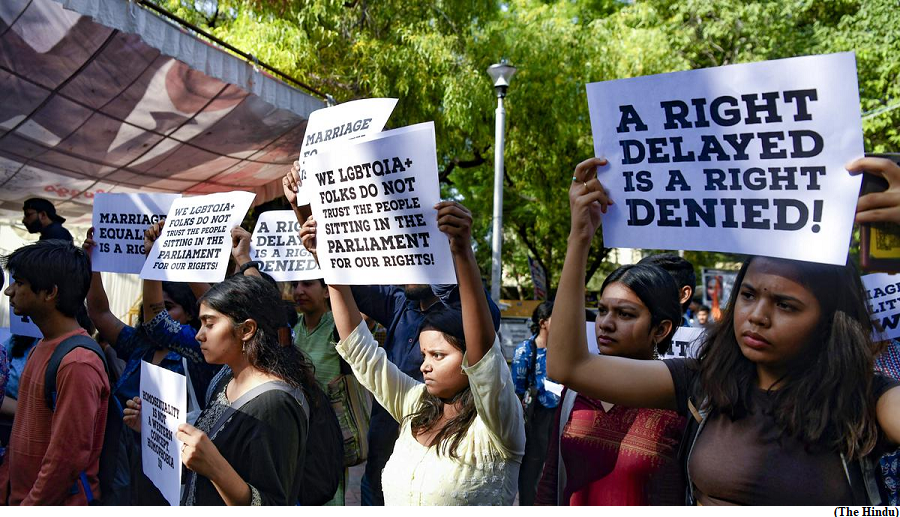A grave error in the law (GS Paper 2, Polity and Constitution)

Why in news?
- In the Supriyo judgment the Supreme Court held that same-sex couples do not have the right to marry under the Special Marriage Act.
- In doing so, the court not only laid down a fundamentally wrong interpretation of the Constitution but also overlooked its own precedents.
Right to equality:
- Article 14 guarantees equality and equal protection of the law and Article 15 prohibits discrimination on grounds including sex.
- The court has held in Navtej (2018) while decriminalising homosexuality that ‘sex’ under Article 15 takes in ‘sexual orientation’. When the state refuses to recognise marriages of homosexual couples, solely on this ground, it violates the constitutional guarantee of non-discrimination.
Highlights of the judgement:
- The majority judgment justifies the exclusion of the Special Marriage Act by saying that the object of the statute was not to discriminate against same-sex persons.
- Further, it is stated that absence of a law (to regulate same-sex marriages) does not amount to discrimination.
Concerns:
- The doctrine of indirect discrimination, which simply means that the discriminator cannot escape the constitutional obligation by relying on the intent or object, has been now well established in Indian jurisprudence. Instead, the court must look at the impact of the law on a particular group (Col. Nitisha v. Union of India, 2021).
- Also, to say that mere absence of a law is not sufficient to claim discrimination misconceives the core of the issue raised by the petitioners. The claim is not that there is a right for the petitioners to have a law enacted by the state in the abstract.
- The argument is that the state has chosen to refuse to recognise one set of marriages on the ground of sexual orientation alone and this is not pointedly met by the Bench.
Separation of powers:
- The minority judgment, in fact, does not address the issue at all by holding that “this Court cannot either strike down the constitutional validity of SMA or read words into the SMA because of its institutional limitations”. This simply puts the cart before the horse.
- It is precisely the institutional purpose of a constitutional court to examine whether the legislation in question is constitutional. Now to say that it will refuse to undertake this exercise because the exercise is complicated runs counter to the established system of constitutional adjudication.
- This position of law, fortunately not accepted by the majority, is dangerous since this might simply mean the Parliament can avoid constitutional scrutiny by drafting laws in a way that requires the court to undertake a complex interpretive exercise.
- This is, of course, not to say that the court must exceed its institutional role of that of an adjudicator. However, to conceive the issue of equal rights associated with marriage as entirely that of policy is problematic.
Earlier guidelines:
- In Visakha v. State of Rajasthan (1997), the court, in the absence of a law, laid down detailed guidelines for how institutions must deal with complaints of sexual harassment.
- In NALSA (2014), the court directed recognition of the rights of ‘third gender persons’ and issued elaborate directions for their protection. Therefore, to stop short of constitutional examination does not fit well in our constitutional history.
- Moreover, reading the Special Marriage Act so as to take in marriages of queer persons did not require the court to legislate.
- A creative interpretation of the law would have allowed the court to locate the right of marriage in the law. Various interpretive techniques and solutions were suggested to the court which simply went overlooked.
A mediating court:
- In one of the directions of the judgment, the court records the submission by the Union government that a committee be chaired by the Cabinet Secretary to decide the entitlements of queer persons. This delegation is where the court simply abdicates its role.
- When a complaint of fundamental rights violation is brought before the judiciary, referring the question back to the alleged discriminator is simply irrational.
Way Forward:
- In Baker v. Nelson (1971), the United States Supreme Court, while declining to hold that same-sex marriage is protected under the Constitution, said that due process clause of the Fourteenth Amendment is not a charter for restructuring it by judicial legislation.
- Then, the court remedied the mistake in Obergefell v. Hodges (2015), where it repelled the argument and said: “It is of no moment whether advocates of same-sex marriage now enjoy or lack momentum in the democratic process. The issue before the Court here is the legal question whether the Constitution protects the right of same-sex couples to marry.”
- Now, India needs to desperately wait for its Obergefell moment.


